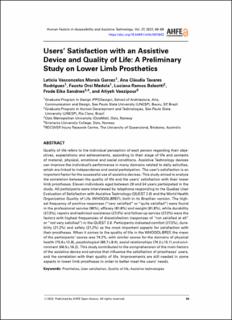| dc.contributor.author | Garcez, Letícia Vasconcelos Morais | |
| dc.contributor.author | Rodrigues, Ana Claudia Tavares | |
| dc.contributor.author | Medola, Fausto Orsi | |
| dc.contributor.author | Baleotti, Luciana Ramos | |
| dc.contributor.author | Sandnes, Frode Eika | |
| dc.contributor.author | Vaezipour, Atiyeh | |
| dc.date.accessioned | 2022-09-29T13:25:00Z | |
| dc.date.available | 2022-09-29T13:25:00Z | |
| dc.date.created | 2022-07-18T10:26:55Z | |
| dc.date.issued | 2022 | |
| dc.identifier.citation | Human Factors in Accessibility and Assistive Technology. 2022, 37, 60–68. | en_US |
| dc.identifier.isbn | 978-1-958651-13-1 | |
| dc.identifier.uri | https://hdl.handle.net/11250/3022571 | |
| dc.description.abstract | Abstract: Quality of life refers to the individual perception of each person regarding their objectives, expectations and achievements, according to their stage of life and contexts of material, physical, emotional and social conditions. Assistive Technology devices can improve the individual’s performance in many domains related to daily activities, which are linked to independence and social participation. The user’s satisfaction is an important factor for the successful use of assistive devices. This study aimed to analyze the correlation between the quality of life and the users’ satisfaction with their lower limb prostheses. Eleven individuals aged between 20 and 54 years participated in the study. All participants were interviewed by telephone responding to the Quebec User Evaluation of Satisfaction with Assistive Technology (QUEST 2.0) and the World Health Organization Quality of Life (WHOQOL-BREF), both in its Brazilian version. The highest frequency of positive responses (“very satisfied” or “quite satisfied”) were found in the professional service (90%), efficacy (81.8%) and weight (81.8%), while durability (27.3%), repairs and technical assistance (27.3%) and follow-up service (27.3%) were the factors with highest frequencies of dissatisfaction (responses of “not satisfied at all” or “not very satisfied”) in the QUEST 2.0. Participants indicated comfort (27.3%), durability (21.2%) and safety (21.2%) as the most important aspects for satisfaction with their prostheses. When it comes to the quality of life in the WHOQOL-BREF, the mean of the participants' scores was 74.2%, with similar scores for the domains of physical health (75.6±12.8), psychological (80.7±9.4), social relationships (74.2±15.1) and environment (66.5±16.2). This study contributed to the comprehension of the main factors of the assistive device and service that influence the satisfaction of prostheses’ users, and the correlation with their quality of life. Improvements are still needed in some aspects in lower limb prostheses in order to better meet the users’ needs. | en_US |
| dc.description.sponsorship | This study was financed in part by the Coordenação de Aperfeiçoamento de Pessoal de Nível Superior- Brasil (CAPES). | en_US |
| dc.language.iso | eng | en_US |
| dc.publisher | AHFE International | en_US |
| dc.relation.ispartof | Human Factors in Accessibility and Assistive Technology. AHFE (2022) International Conference | |
| dc.rights | Navngivelse 4.0 Internasjonal | * |
| dc.rights.uri | http://creativecommons.org/licenses/by/4.0/deed.no | * |
| dc.subject | Prosthetics | en_US |
| dc.subject | User satisfaction | en_US |
| dc.subject | Quality of life | en_US |
| dc.subject | Assistive technologies | en_US |
| dc.title | Users’ Satisfaction with an Assistive Device and Quality of Life: A preliminary study on lower limb prosthetics | en_US |
| dc.title.alternative | Users’ Satisfaction with an Assistive Device and Quality of Life: A preliminary study on lower limb prosthetics | en_US |
| dc.type | Chapter | en_US |
| dc.description.version | publishedVersion | en_US |
| dc.source.pagenumber | 60-68 | en_US |
| dc.source.volume | 37 | en_US |
| dc.source.journal | Human Factors in Accessibility and Assistive Technology | en_US |
| dc.identifier.cristin | 2038605 | |
| cristin.ispublished | true | |
| cristin.fulltext | original | |

